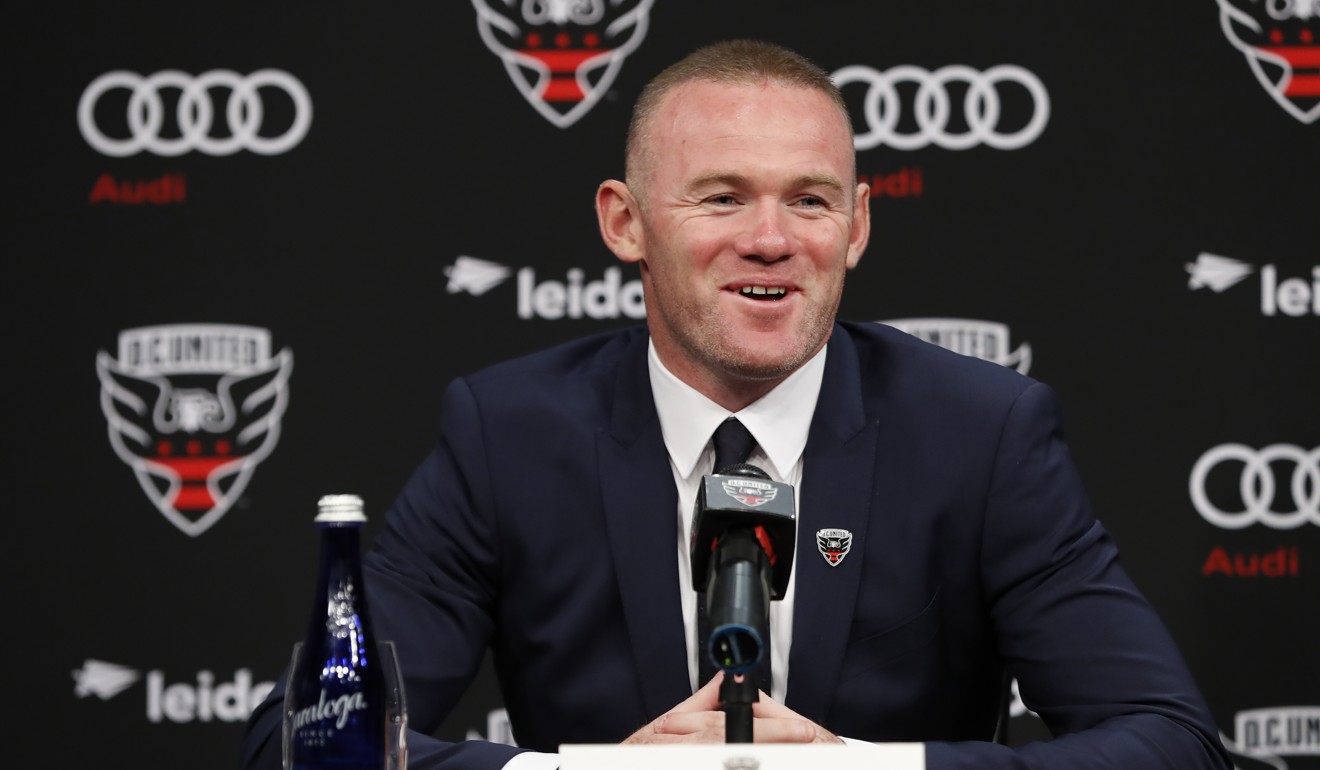
England record scorer Wayne Rooney limps off to Major League Soccer cellar dwellers DC United, but we haven’t heard the last of him
New DC United signing is younger than former teammate Cristiano Ronaldo but heads to US for a final flourish before possible punditry career
“I have a (Manchester United) contract until 2019 that I want to see out and wouldn’t be against extending it, but that’s up to the club,” said Wayne Rooney when this writer spoke to him two years ago. “After that who knows, but I won’t play for any other Premier League clubs.”
Rooney, 30, was captain of England and Manchester United, and could have had another four years in him, but a year later he was allowed to rejoin Everton.
Rooney’s still only 32, still the most famous English player and the same age as his former United teammate Ashley Young, but one started in the triumph against Colombia in Moscow and one no longer figures for his national side.
Age comparisons can make Rooney’s situation look sad. He’s a year younger than Cristiano Ronaldo, the man he’d done the running for as United became the best team in England, Europe and the world, yet he’s a long way short of the Portuguese’s level.
Rooney signed a two-year contract at Everton, but stayed only a year. The hype of feel-good messages about coming home couldn’t disguise he was in decline, a decade after he was United’s best player, better even than Ronaldo in the eyes of his teammates.
“Evertonians welcomed Rooney back to the fold – the prodigal son had returned,” said lifelong Everton fan David Swaffield. “Whilst he made an impact and scored some important goals, fans realised his presence distorted team selection, formation and use of players in their correct roles. “There hasn’t been an outcry about his transfer to Major League Soccer because things are different: with the world at his feet in 2004, we wanted him to stay, yet he wanted to leave; now, some 14 years later, it is Rooney that wanted to stay but the fans weren’t too disappointed to see him go.”
But is Rooney to blame for his decline or are Ronaldo, Ryan Giggs (who played until he was 40) and their like the exceptions?
Despite the advances in medical science, it seems the average length of a player’s career has not lengthened since before the second world war.
Players are making their debuts much younger and have been doing so since the 1950s, but it seems as if there is only so much the body and mind can take. Some previously career-ending injuries like cruciate ruptures can be fixed, but the modern game also has an emphasis on speed – and Rooney’s isn’t what it was.
The wily older players who never relied on speed – think Teddy Sheringham – can age gracefully and get their running done for them by others, yet Rooney was a breathtaking runner, an impact player and often a workhorse.
Rooney hoped to emulate Giggs’ longevity and spoke to him about the yoga regime which the Welshman had adopted, but Giggs was a freak of nature, just as Stanley Matthews and Billy Meredith were, two greats of yore who played until they were 50.
Matthews did so because of his own (then thought to be oddball) fitness regime of running on Blackpool beach and a spartan diet – and because he was an institution. If he was tackled roughly he would shake his head and ask his assailant ‘Why do you have to do that, son?’ as the crowd booed. Meredith, a lifelong teetotaller, recommended rubbing an industrial lubricant called ‘dog oil’ on the legs.

Given former Manchester United legend George Best quit the club at 27 and Eric Cantona retired at 30, Rooney’s record doesn’t compare unfavourably.
Rooney managed 40 games for a poor Everton side last season, scoring a creditable 11 goals. He could have seen out another year on his contract, just as he could have seen out his United contract – but he and both clubs reached compromises.
If he wants to go to the US with his family is that such a bad idea, even if it means his wages dropping by more than 50 per cent to US$5 million a year?
There will be commercial opportunities, though he never came close to the endorsements secured by Ronaldo and Messi. Infidelities and his habit of speaking his mind hit Rooney’s commercial appeal, but Best and Cantona were no angels either.
Of course, Rooney would still prefer to be England and United captain and playing every game, rather than turning out for DC United, the lowest supported of all 23 MLS teams and the side who are five points adrift at the bottom of the Eastern Division, but his legs ceased to be good enough to do that.
Maybe he’s the man to start a fightback for a club who moved into their new 20,000 capacity stadium this month, the man to put bums on seats.
Rooney has played 671 club games and scored 279 goals. He’s played a further 119 times for England, scoring 53 times. He’s United’s and England’s leading all-time goalscorer and won the Champions League, five Premier Leagues, four League Cups, the Europa League, FA Cup and a Fifa Club World Cup.
History will remember him as a legend and while his autobiographies – he’s done more than one – hugely disappointed, he does have a brain and was excellent when allowed off the leash on British TV this year as an analyst. We’re likely to be hearing plenty more from him yet.

